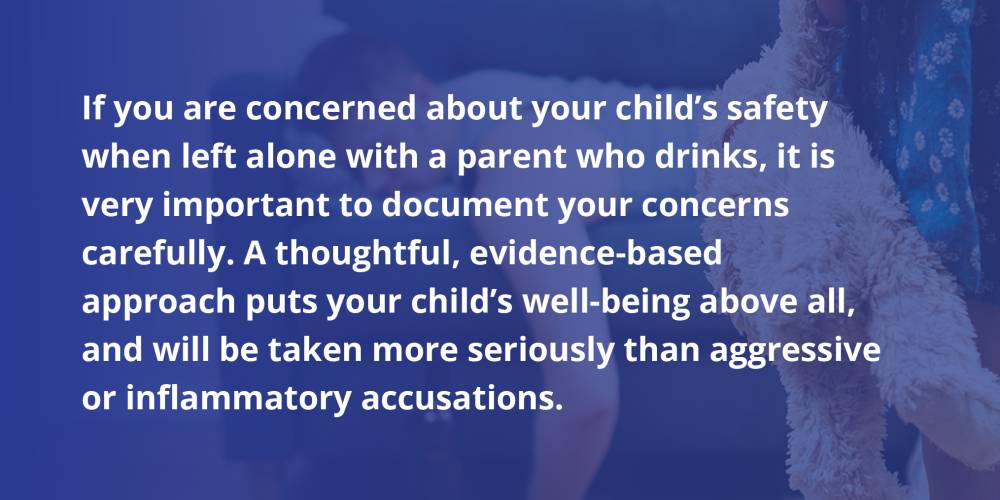Alcohol Abuse and the Divorce Process in Illinois
 Alcohol abuse does not always lead to divorce, but when it does, it becomes far more complicated, especially when young children are involved. From worries about visitation to concerns about safety and money, substance abuse can influence almost every aspect of a divorce case. If your spouse has a drinking problem, or if you are being accused of alcohol abuse yourself, it is important to understand how Illinois divorce courts could deal with these situations.
Alcohol abuse does not always lead to divorce, but when it does, it becomes far more complicated, especially when young children are involved. From worries about visitation to concerns about safety and money, substance abuse can influence almost every aspect of a divorce case. If your spouse has a drinking problem, or if you are being accused of alcohol abuse yourself, it is important to understand how Illinois divorce courts could deal with these situations.
At The Law Office of Matthew M. Williams, P.C., our Yorkville, IL divorce attorney approaches cases involving alcohol abuse with both compassion and strategy. With nearly 25 years of experience practicing family law, and a background working with troubled youth and high-conflict families, we understand the damage alcohol misuse can cause and the healing that is possible when families have the right support.
Attorney Williams strives to resolve divorce cases amicably whenever possible, through mediation or collaborative law, while protecting your rights and your children’s well-being. Competitive rates and flexible payment plans are available to ensure access to the help you need.
Does Alcohol Abuse Affect Grounds for Divorce in Illinois?
Illinois is a no-fault divorce state. Under 750 ILCS 5/401, the only ground for divorce is "irreconcilable differences," and courts do not require proof of wrongdoing or substance abuse to grant a divorce. However, just because substance abuse is not considered a legally recognized reason to file for divorce does not mean it will not impact your case.
Alcohol and drug abuse can influence the court’s decisions in areas such as parenting time (visitation), parental responsibilities (decision-making), and, in some cases, property division. If your spouse’s drinking habits have created safety risks, financial instability, or emotional trauma for your family, the judge can weigh those facts when determining a final outcome.
How Does Alcohol Abuse Affect Parenting Time?
Parenting time and decision-making authority are awarded based on the "best interests of the child" standard (750 ILCS 5/602.7 and 5/602.5). If one parent abuses alcohol, the court may decide that unrestricted parenting time would put the child at risk. Some possible court responses include:
-
Requiring supervised parenting time
-
Restricting overnight visits
-
Ordering the parent with abuse issues to complete alcohol treatment or counseling
-
Mandating alcohol testing prior to parenting time
-
Granting sole decision-making authority to the other parent
Importantly, the court will consider patterns of behavior, not isolated incidents. If a parent has been arrested for DUI, failed to follow court orders, or repeatedly shown reckless behavior under the influence, those facts will carry significant weight. On the other hand, if someone has a past history of misuse but has since entered recovery, that will also be taken into account.
If you are concerned about your child’s safety when left alone with a parent who drinks, it is very important to document your concerns carefully. Medical records, police reports, witness statements, and even texts or emails may become important evidence. A thoughtful, evidence-based approach is one that puts your child’s well-being above all, and will be taken more seriously than aggressive or inflammatory accusations.

What If I Am Accused of Alcohol Abuse in My Divorce?
In some high-conflict divorces, one parent may weaponize the label of "alcoholic" to gain leverage. We see this often, particularly in custody negotiations. If you are being accused of having a drinking problem and believe the claims are exaggerated or false, your attorney can help you respond with proof.
It may be appropriate to provide medical records, treatment records, or evidence of a stable daily routine. In some cases, voluntarily submitting to alcohol testing or counseling, even if not court-ordered, can help show your commitment to sobriety and responsible parenting.
At The Law Office of Matthew M. Williams, P.C., we have seen firsthand how accusations of substance abuse can damage a parent’s relationship with their child if left unaddressed. We work with clients to resolve disputes in a way that minimizes harm, avoids escalation, and protects long-term relationships when possible.
Will Alcohol Abuse Affect Property Division or Maintenance?
Illinois is an equitable distribution state. Although the law does not directly punish a spouse for drinking, it does allow the court to consider whether one party "dissipated" marital assets.
For example, if a spouse spent large amounts of money on alcohol, DUIs, or legal fees stemming from alcohol-related incidents, the other spouse may claim dissipation. If the court accepts this claim, it can award a larger share of the remaining assets to the non-offending spouse. Dissipation claims must be filed properly and on time, so it is important to work with a lawyer who understands the rules and deadlines involved.
Alcohol abuse may also influence decisions about spousal maintenance (formerly called alimony). If one spouse’s earning potential has been damaged due to substance use, or if financial contributions were impaired by addiction, the court may adjust support accordingly.
Can We Still Try Mediation or Collaboration if Substance Abuse is Part of Our Divorce?
Divorces involving substance abuse can be deeply emotional and legally complex, but that does not mean they must be litigated in open court. Mediation and collaborative law offer a more private, respectful alternative to traditional divorce. With the guidance of trained professionals, both parties work toward an agreement on parenting time, asset division, and support, without the need for a public trial. When addiction is a factor, these processes can help preserve the dignity of both spouses while protecting the children involved.
What If My Spouse Refuses Help or Becomes Dangerous During Divorce?
In cases where a spouse’s alcohol abuse leads to violence, threats, or unpredictable behavior, more urgent action may be necessary. Protective orders, emergency custody, or court-supervised visitation may need to be pursued. If you are concerned for your or your child’s safety, do not wait. These situations require swift legal support and careful safety planning.
Our firm is committed to protecting clients in volatile situations with discretion and care. While we prefer peaceful resolution when possible, we are prepared to take firm legal steps when needed to secure your family’s safety and get you the best possible outcome.
Contact a Yorkville, IL Divorce Lawyer Today
Alcohol abuse can make even the simplest divorce very difficult, but with the right support, you can move forward. At The Law Office of Matthew M. Williams, P.C., our Kendall County, IL divorce attorney combines nearly a decade of legal experience with real-world understanding of addiction, family conflict, and the importance of protecting children during times of upheaval.
We offer flexible payment plans and competitive rates to make high-quality legal representation more accessible. We are committed to delivering value, strategy, and peace of mind from day one. If you are facing divorce and alcohol abuse is part of the picture in any form, we are here to help.
Call us today at 630-409-8184 to schedule a free, confidential consultation and take the first step toward a better future.

 630-409-8184
630-409-8184













